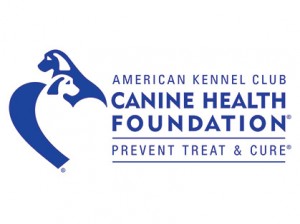AKC Canine Health Foundation Announces New Grants for Canine Health Research
 The AKC Canine Health Foundation (CHF), a nonprofit organization whose mission is to prevent, treat and cure canine disease, has awarded 28 new canine health research grants in 12 different research program areas since the start of 2019. More than one third of the recently funded grants have One Health significance, indicating that findings may inform both human and canine health.
The AKC Canine Health Foundation (CHF), a nonprofit organization whose mission is to prevent, treat and cure canine disease, has awarded 28 new canine health research grants in 12 different research program areas since the start of 2019. More than one third of the recently funded grants have One Health significance, indicating that findings may inform both human and canine health.
An updated 2019 Research Grants Portfolio details the recently awarded grants, along with all currently active research projects being funded by CHF and its donors. The research program areas receiving new funding are:
- Blood Disorders
- Cardiology
- Dermatology & Allergic Disease
- Epilepsy Initiative
- General Canine Health
- Hepatic Disease
- Immunology & Infectious Disease
- Musculoskeletal Conditions & Disease
- Neurology
- Oncology
- Ophthalmology
- Tick-Borne Disease Initiative
Notable highlights include the following:
Grant 02653-A: Evaluation of the Serum and Cutaneous Levels of Chemokines in Atopic Dogs
Investigators are studying immune-modulating inflammatory molecules in dogs with atopic dermatitis which could inform monitoring and treatment strategies for dogs affected with this common condition.
Grant 02643-A: Examination of the Effects of Cannabidiol on Canine Neoplastic Cell Apoptosis/Autophagy and Potential for Chemotherapy Resistance or Sensitivity
Investigators are studying the cytotoxic effects of chemotherapy and cannabidiol (CBD) on cancer cells, and the molecular pathways involved in the cell death response. The research may improve understanding of the use of CBD-rich extracts for the treatment of canine cancer.
Grant 02604: Clinical, Pathologic, and Molecular Genetics Investigations of Canine Lysosomal Storage Diseases and Related Diseases
Investigators are studying novel canine lysosomal storage diseases in different dog breeds and mixed breed dogs to help veterinarians diagnose these rare, but important neurologic diseases. Results will also inform breeding decisions within affected dog breeds.
Grant 02561: Is Gut Dysbiosis Associated with Canine Idiopathic Epilepsy?
Investigators are exploring the association between the gut microbial population and canine epilepsy in order to develop more effective treatments for this common neurologic disease.
Grant 02553: Targeted Next Generation Sequencing Panel for Comprehensive Testing of Vector-Borne Pathogens
To improve diagnostic accuracy, investigators are developing a comprehensive next generation sequencing panel to detect and identify major vector-borne (spread by blood-feeding insects such as ticks) disease agents known to cause disease in dogs.
“Following a rigorous scientific review process, these new grants were selected to support the most important health needs of dogs. Investing in such cutting-edge health research projects is how CHF and our donors will help ensure a healthier future for all dogs,” states CHF Chief Executive Officer Dr. Diane Brown.
Through its canine health research grants program, CHF is dedicated to finding and funding more accurate diagnostics and more effective treatment and prevention strategies for the health of all dogs across their entire lifetime. Learn more about CHF’s work and fiduciary responsibility in the 2018 Annual Report.
Right now, through the generosity of the American Kennel Club, donations from new and lapsed donors (those whose last gift was made prior to 1/1/18) and donations to CHF’s Canine Cancer Research Initiative will be matched with an equal donation to CHF for canine health research. These match opportunities are instrumental in providing additional funding for much-needed research grants for canine health. Please join us today at akcchf.org/match.
Short URL: http://caninechronicle.com/?p=161605
Comments are closed











